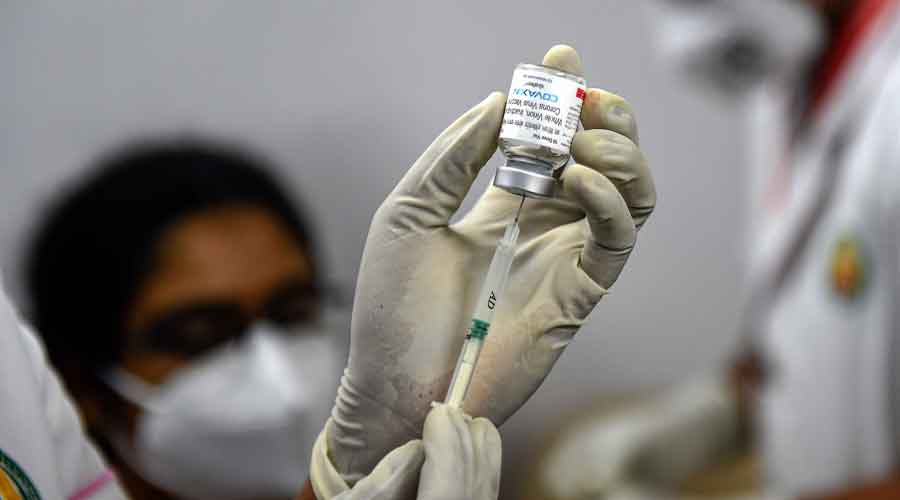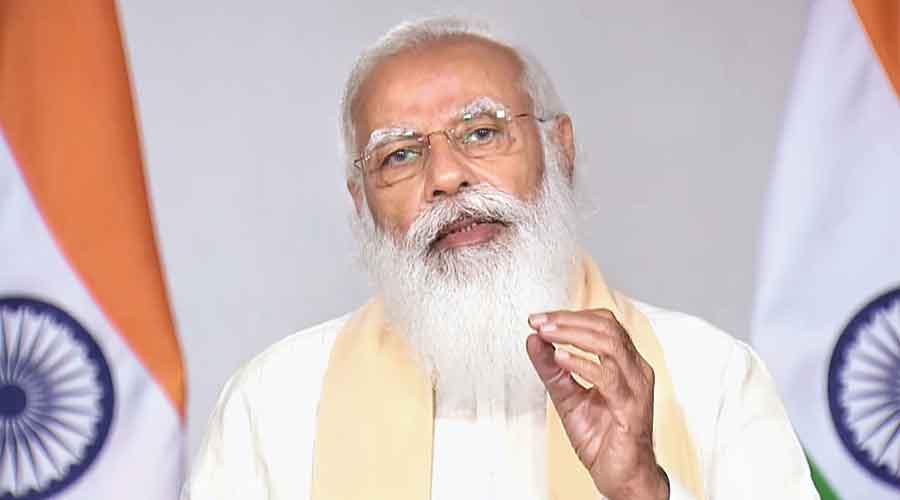India’s expanded Covid-19 vaccination campaign, open for all adults from May 1, is set to start with a lower-than-expected momentum amid limited vaccine supplies and appeals from some states asking people not to rush for jabs.
Authorities in at least five states — Delhi, Karnataka, Goa, Punjab and Rajasthan — have said they are still awaiting stocks to enable them to start vaccinating the 18-to-45-year population group. And private hospitals have said they’re waiting to gain access to the online vaccination system.
On Friday, Punjab chief minister Amarinder Singh cited a shortage of vaccines to defer vaccinations for the 18-to-45-year group and announced that vaccinations at private health facilities would remain suspended on Saturday.
Amarinder said that since all private health facilities had to return their unused vaccines to the Centre by Friday evening, these facilities would have no vaccines to administer on Saturday even for the 45-and-above age group.
Punjab, Amarinder said, had received 200,000 doses but that was not sufficient to meet even two days’ requirement for inoculating those aged 45 or more.
Punjab had on April 26 ordered 3 million doses of Covishield from the Serum Institute of India, Pune, but was told that “the availability of the vaccine will be known only in four weeks’ time”, the chief minister’s office said in a media statement.
In Delhi, chief minister Arvind Kejriwal said his government would soon announce the vaccination campaign but added that it was still waiting for more vaccine doses to arrive. He asked citizens not to queue at vaccination centres before the announcement.
“I request everyone not to rush,” Kejriwal said. “The vaccines have not reached us yet. But we’re in touch with the companies and hope the vaccines will be delivered in a day or two.”
Kejriwal said Delhi had ordered 6.7 million doses each of Covishield and Covaxin for the next three months.
“We are trying our best to vaccinate the population in Delhi within the next three months,” Kejriwal said. “We have formulated a plan, and even the infrastructure needed for this is in place. Now it will depend on the two companies how swiftly they give us the vaccines.”
Experts and industry executives have predicted vaccine shortages in the early weeks of the campaign’s new phase, which has more than doubled the number of potential beneficiaries from around 350 million to nearly 900 million without immediate provisions for the extra doses.
India’s current production capacity is between 80 million and 90 million doses a month: 70 million doses of Covishield from the Serum Institute and 10 to 20 million doses of Covaxin from Bharat Biotech. Both companies have announced plans to ramp up production in the coming weeks.
In the new phase, private hospitals can directly procure doses from the manufacturers. An Apollo Hospitals executive said the group had already procured doses to support vaccination in seven cities — Ahmedabad, Bangalore, Chennai, Kochi, Delhi, Hyderabad and Mumbai — for about a week.
“But we need to have access to the online platform to link our hospitals with those who have registered themselves for the vaccines,” the executive told The Telegraph over the phone from Hyderabad.
The vaccine makers have said their priorities are the central government, which will get 50 per cent of the doses, then the state governments and finally the private hospitals, which will get only small proportions of the doses manufactured.
Covishield carries a price tag of Rs 300 for state governments and Rs 600 for private hospitals, while Covaxin will cost Rs 400 for state governments and Rs 1,200 for private hospitals.
The Apollo executive said the cost for the beneficiaries would follow government guidelines.
Uttar Pradesh said on Friday that it would start vaccinating the 18-to-45 group from May 1 in districts with more than 9,000 active Covid-19 cases. These include Lucknow, Kanpur Nagar, Allahabad, Varanasi, Meerut and Bareilly, the state government said on Twitter.
Rajasthan health minister Raghu Sharma said on Friday that the state would use an available 300,000 extra doses to start vaccinating the 35-to-45-year group from May 1 in nine cities.
He said Rajasthan needed around 70 million doses to cover the 18-to-45 age group and had ordered 30 million doses, but was told by the Serum Institute on Thursday that it would for now receive 300,000 doses.
“Given our large population of beneficiaries, how do we distribute 300,000 doses? Who do we give doses to and who do we leave out?” Sharma said.
In Karnataka, health minister K. Sudhakar urged people between 18 and 45 through a television channel to “refrain from going to hospitals on Saturday, thinking they’ll get vaccines”, as the state is waiting for extra doses to arrive.
The nationwide vaccination campaign has administered more than 154 million doses since its start on January 16, first for healthcare and frontline workers, then for everyone aged 60 or older, and then for those aged 45 or above.
Only about 28 million people (or 2 per cent of India’s population) have received the two vaccine doses required for protection.
The health ministry had initially resisted calls from the states and sections of doctors to open up the campaign for all adults, citing India’s limited supply of vaccines. Health experts believe the decision to allow the state governments and private hospitals to vaccinate the 18-to-45 group reflects a plan to shift the responsibility of vaccinating all adults to the states and the private sector without making provisions for the doses required.












